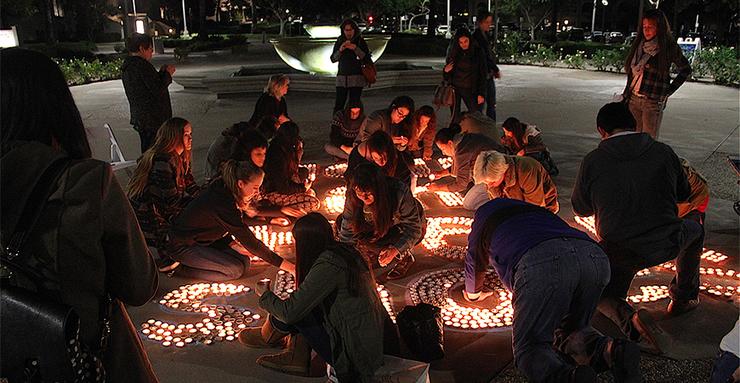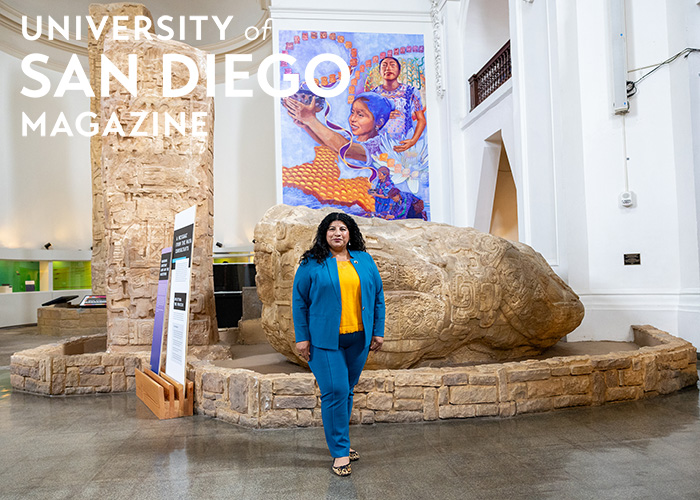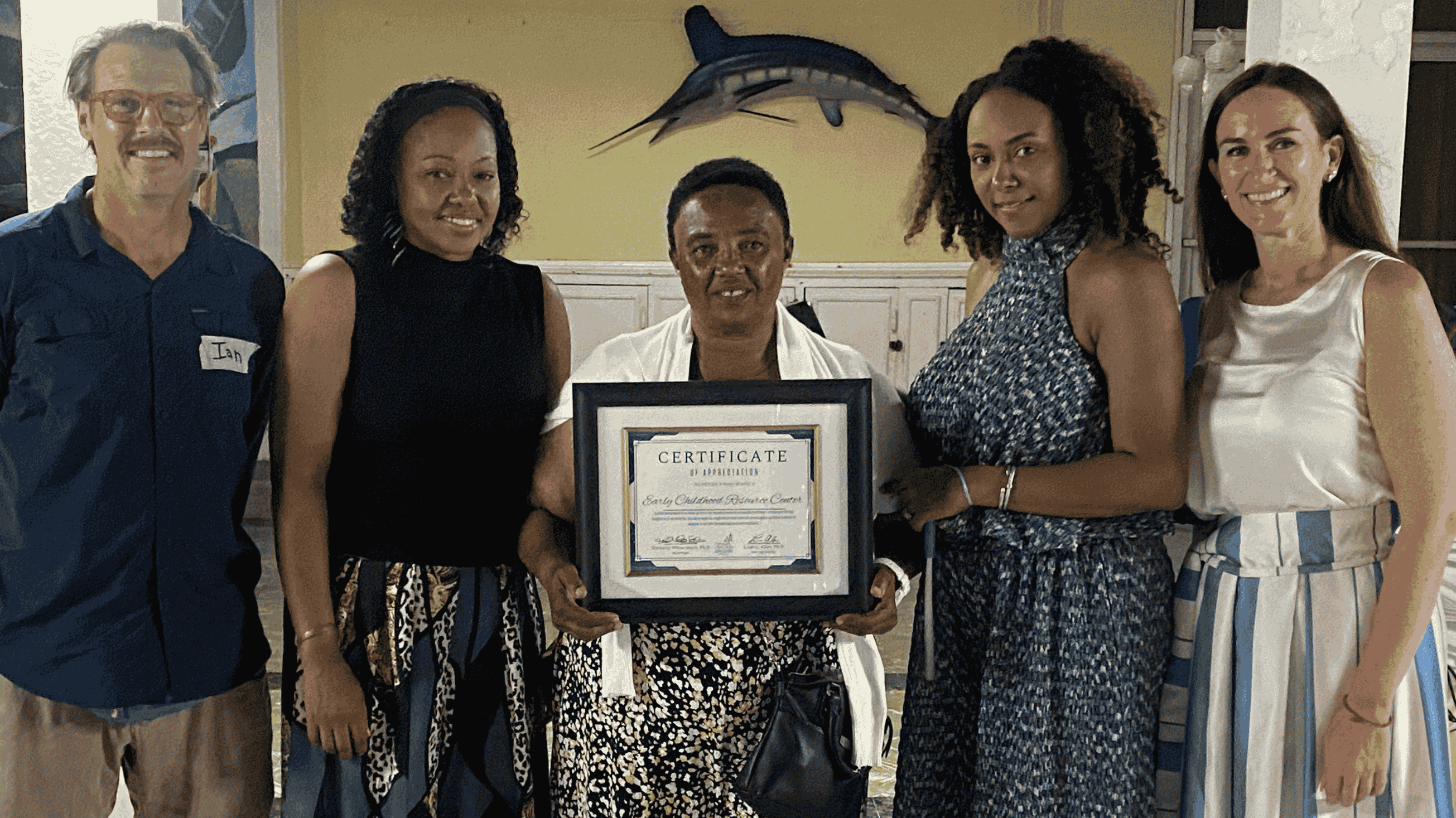USD Event Raises Awareness of Human Trafficking
 USD and Breaking the Silence Together co-hosted an event, "Walk in Their Shoes: Standing with Survivors of Sex Trafficking," on Dec. 1. Attendees lit small candles in support of victims.
USD and Breaking the Silence Together co-hosted an event, "Walk in Their Shoes: Standing with Survivors of Sex Trafficking," on Dec. 1. Attendees lit small candles in support of victims.Across the world there are more than 20 million victims of human trafficking. More than 4.5 million of those individuals are victims of sex trafficking, including many of society's most vulnerable citizens, like children.
While this modern-day slavery is a global and national problem, it has deep roots in San Diego County. Each year, approximately 10,000 sex trafficking victims or survivors in the county live and work in every city. The sex trafficking industry annually generates $810 million, a number that rivals the county's natural resources and mining sector.
On Dec. 1, the University of San Diego hosted an event, "Walk in Their Shoes: Standing with Survivors of Sex Trafficking," to raise awareness of this problem, provide information through art, music, theatre, personal stories, local organizations, researchers, medical experts and law enforcement officials.
"Your presence speaks to where your heart is and how much this matters to you that you want to learn about it, or, if you're already an expert in it, that you still continue to learn," said Summer Stephan, San Diego's chief deputy district attorney, to the audience in the Joan B. Kroc Institute for Peace and Justice Theatre. "I learn every day but the people I learn from the most in my 27 years as a prosecutor fighting for justice for victims are the victims, who are the survivors and then thrivers."
Powerful Presentation
Last Thursday's event presented several visual elements that stirred emotions, raised the empathy level, offered ways to be in solidarity with those who suffer emotional and physical pain that, according to Rachel Robitz, MD, a UC San Diego Community Psychiatry Fellow, is considered as “complex post-traumatic stress disorder.”
Artwork titled, "My Life is a Rare Gift from God," by Iranian artist Hanieh Mohammad Bagher was equally stirring, and a social justice theater piece by a Point Loma Nazarene University-connected program called kNOw MORE! connected with the audience. Four actors simulated the emotional plight of human trafficking victims, from outrage to submission to shame to hopelessness.
And then there were the shoes. Leading into the IPJ were stray shoes of different colors and some that were a child's size. In the center of the IPJ Rotunda was a display of shoes, each one connected to a chain and accompanied by personally written stories by victims of sex trafficking. Some spoke of being forced into it by an abusive and controlling boyfriend. Some were molested by family relatives at a young age or those who grew up in a broken home and it led them into a deeper abyss. Each story brought the reality of human trafficking to life and unavoidably, right before your eyes.
Tiffany Mester, a local human trafficking victim who shared her story, said the actors’ presentation "really struck chords within me. The shoes on display touched my heart."
A Need to Work Together
Danny Santiago, a 30-year law enforcement veteran, is an important local voice to raise awareness. He's commander of the San Diego Human Trafficking Task Force, a group created by a San Diego Human Trafficking Advisory Council. The task force brings together law enforcement agencies with federal, state and local ties to collectively battle this criminal activity.
A four-point plan for fighting human trafficking in San Diego, Santiago said, is through prevention, protection, prosecution and partnerships. The partnerships aspect is most important, he added, because it's a crime that cannot be stopped by just one entity.
It echoes what Secretary of State John Kerry said upon the release of a 2015 U.S. State Department report on Trafficking and Persons: "No nation can end modern slavery alone. Eliminating this global scourge requires a global solution. It cannot be solved by governments alone. The private sector, academic institutions, civil society, the legal community and consumers can all help to address the factors that allow human trafficking to flourish," recalled Daniel Orth, IPJ program officer and co-organizer of the Dec. 1 event with Aliza Amar, founder and director of Breaking the Silence Together.
Said Santiago: "The people who become aware need to make other people aware. You'll write a story and it will be read by someone who can email it to a friend and ask them if they're aware of this problem. Some people think this is only an international problem. It isn't. We all need to be advocates for raising the awareness of human trafficking."
Joan B. Kroc School of Peace Studies Associate Professor Ami Carpenter, PhD, praised Santiago and the task force’s work, which routinely draws the attention of officials nationally and internationally to learn more about San Diego's efforts.
USD’s Carpenter Offers Research Insights
Carpenter offered insights from "Measuring the Nature and Extent of Gang Involvement in Sex Trafficking in San Diego," a groundbreaking three-year study she co-authored with Jamie Gates, director of Point Loma Nazarene University's Center for Justice and Reconciliation Professor. The study centered on the issue by way of San Diego’s gangs, of which there are more than 100, and have had some involvement in human trafficking of adults and children.
• “It's estimated in any given year there's between 3,400-8,400 victims or survivors in San Diego, so an average of 5,760. One-third of that number have come in contact with law enforcement so it means that two-thirds don't come in contact with law enforcement nor social agencies.”
• “A lot of people think we're still working on being able to see victims. We found in our study that 50 percent of adults arrested for prostitution meet the federal definition of a sex trafficking victim, but they are misidentified within the criminal justice system.”
• “The average victim is trafficked for three years before reaching the attention of law enforcement. That's important because the average age a minor is recruited is 16, which means by the time a person comes in contact with law enforcement or arrested for prostitution, they're over 18, so they're an adult.”
• “In San Diego, 80 percent of survivors are domestically trafficked. That's important because it runs counter to the popular perception that trafficking comes from those other countries. Twenty percent do, and 11 percent is from Mexico.”
Which brought forth this sobering comment from Carpenter based on her research.
“Human trafficking in San Diego is a countywide problem. There's no community that's untouched by this, not La Jolla, not Del Mar, not Rancho Santa Fe. Once you’re in the life, there are a lot of chains that will keep you there.”
Awareness and Social Action
Awareness is important. Small candles lit in the IPJ’s Garden of the Sky spelled out "Walk in Their Shoes" for a visible sign of support and remembrance of the victims. But reporting to authorities when a person sees or suspects human trafficking is crucial. Stephan said San Diegans are responding well above the national average — she said there's been a 28 percent rise for reporting it in San Diego County compared to less than a 1 percent rise, on average, across the rest of the nation according to the National Human Trafficking Center.
Stephan said the advisory council's integrated system, by operating "in a very open manner," is helping San Diego fight back.
"We call out and say to researchers like Dr. Carpenter, ‘we're an open book. We have a problem in San Diego. San Diego is on the list for high-intensity child prostitution and we're not going to be worried that it's going to affect our image, or affect tourism. We're not going to cover it up as some people like to do with their problems.’ If we do that, we're turning our backs on the victims," Stephan said.
"We need to shed a light, put a spotlight on it. So help us by doing the research that exposes this problem. Good people can't turn away. We need to look; we need to see it. The main problem in the world, when evil thrives, is when people refuse to look at it with their eyes. They refuse to see it, and acknowledge it and call it out. It's the courage to do that. It's about good people. Doing nothing is not an option if we want to be a civilized society."
— Ryan T. Blystone



